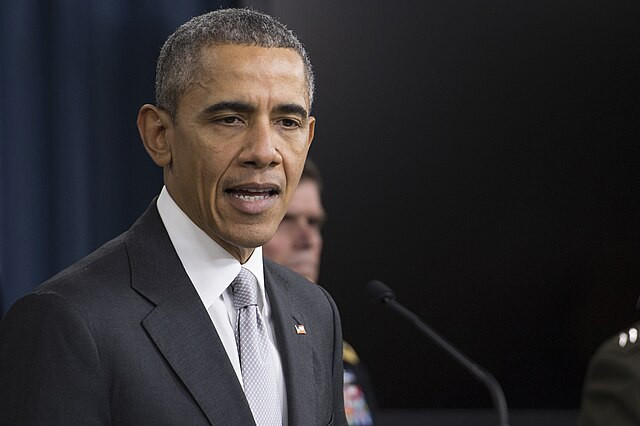In his first public address since the 2024 election, former President Barack Obama delivered a forceful message on the state of American democracy and the perils of political polarization during the Obama Foundation's Democracy Forum on Thursday.
Obama opened his speech with a stark warning against the consolidation of power, stating, "if one side attempts to cement a permanent grip on power through suppressing votes, politicizing the military or weaponizing the judiciary and criminal justice system to target opponents, a line has been crossed." This declaration comes at a time when a significant portion of the American populace believes that President-elect Donald Trump is being subjected to politically motivated legal challenges.
The former president underscored the vulnerability of democratic institutions, remarking, "You see, it's easy to give democracy lip service when it delivers the outcomes we want. It's when we don't get what we want that our commitment to democracy is tested." These insights reflect widespread concerns regarding the use of the judiciary and law enforcement against political adversaries, a recurring theme since Trump's administration.
Obama's tenure from 2009 to 2017 was marked by intense political battles, including the impeachment and subsequent acquittal of President Trump in the Senate, as well as multiple indictments that many critics viewed as "lawfare" against the Republican leader. Despite calls from some Republicans to impeach President Biden, the GOP has refrained from such actions even after gaining control of the House chamber, highlighting the complex and often contradictory nature of current political dynamics.
A central theme of Obama's speech was his advocacy for pluralism. "Pluralism is not about holding hands and singing 'Kumbaya.' It is not about abandoning your convictions and folding when things get tough," he asserted. Obama elaborated that pluralism involves "recognizing that in a democracy power comes from forging alliances and building coalitions," emphasizing its necessity for achieving enduring political change.
Reflecting on the historical context of American pluralism, Obama noted, "The biggest reason that American pluralism seemed to be working so well mainly had to do with who it left out. The fact is, for most of our history, our democracy was built on top of a deeply entrenched caste system - formal and informal, based on race and gender and class and sexual orientation." He highlighted how systemic barriers have long excluded significant portions of the population from accessing political power.
Obama also addressed the current state of political discourse, condemning the escalating polarization. "It is almost now complete, with each party more and more uniform in its beliefs and less tolerant of dissenting views," he stated. He criticized the media for exacerbating divisions, explaining, "Media companies have figured out that there's profit in playing to the extremes. Since that's what gets attention, politicians, party leaders, and interest groups are incentivized to take a maximalist position on almost every issue."
Despite these challenges, Obama remained hopeful about the future of democracy. "Can the idea of pluralism work in the current moment? And, for that matter, is the concept even worth saving? I believe the answer is yes," he affirmed. He called for a renewed commitment to pluralist principles, asserting that such dedication is essential for democracy to survive as it is currently understood.
In light of recent political tensions, Obama referenced President Biden's controversial remarks earlier this year, where Biden was perceived to have referred to Trump supporters as "garbage." Biden later clarified on X, stating he was specifically addressing "the hateful rhetoric about Puerto Rico spewed by Trump's supporters at his Madison Square Garden rally as garbage." This incident underscores the heightened rhetoric and divisions that have characterized recent political interactions.
Concluding his speech, Obama emphasized that bridge building represents the "best tool" to create "lasting change". He advocated for collective action and coalition-building, even amidst deep-seated differences, to cultivate a more inclusive and resilient democracy.
Obama's remarks at the Democracy Forum serve as a timely reminder of the ongoing struggle to uphold democratic norms and the critical need for embracing diversity in political discourse. His call for pluralism and vigilance against authoritarian tendencies aims to inspire a more unified and principled approach to governance in an increasingly divided nation.






